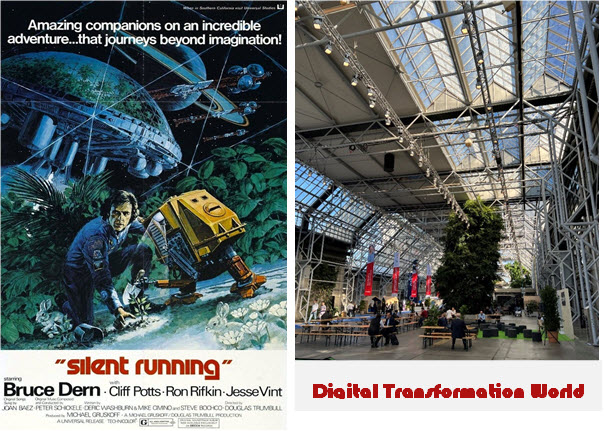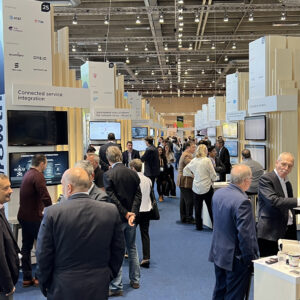New venue, new city, new dates – but was it plus ca change at Digital Transformation World 2022?
The TM Forum’s Digital Transformation World – the flagship convention for the telecom software industry for over twenty years – returned to an in-person event after a two-year Covid-enforced gap. Living up to the spirit of its transformation title, it has a new format, time of year and home venue for the next three years: Copenhagen’s Bella Centre.
Impressively, DTW2022 attracted over 3,000 delegates to Copenhagen.
The move could hardly be more apposite for the telecom software community: a shift away from familiar, yet brutally monolithic and aging infrastructure: the Acropolis Center in Nice, long overdue substantial overhaul; cosmetic adjustments made over recent years failing to address its real problems. In truth, the Acropolis was built for a different era (it opened in 1984).
Compared to the Acropolis, the Bella Centre is at least delightfully simple to get to from the centre of Copenhagen. While the on-site Marriott is modern and ultra-convenient, seasoned conference-goers figured correctly that downtown would be the better bet for food & lodging.
DTW is fundamentally about networking. The new venue affords much better space for that. And thumbs up to the Forum for taking advantage of the greater space with plenty of spots for impromptu catchups and charging points. Sponsors also got much better meeting room space than in Nice.
The use of a more intimate TED-like auditorium for keynotes, with big screens in the main concourse was another welcome modernisation. Well done, the Forum.
The new (and larger) space in the venue meant there was no obvious prestige real estate, booth-wise. And that’s good, because all the aisles got some footfall as delegates familiarised themselves with the show’s new home.
Strong and serious show floor presence from Amdocs, Netcracker, HPE, Nokia, Ericsson and Oracle, Google Cloud, but no IBM or VMware (perhaps understandable, given the ongoing takeover by Broadcom). AWS had a large and prominent booth, which featured demonstrations from vendor partners. Microsoft seemed a surprisingly low-key presence, given the telecom assets it now possesses – but TMW Nice was always an “OSS” show more than a network show.
The spacious new venue may have made it feel like the show floor was less busy than in Nice days, but most vendors we spoke to were happy overall with the quality and quantity of traffic, reporting a decent showing from senior contacts at operators. Just as with MWC Barcelona, there seemed to be a greater purposefulness to conversations.

The Bella Centre’s glass, steel and greenery recalled the 1972 cult eco-sci-fi movie “Silent Running”. Many of this year’s attendees may well remember that movie. The high average age in our industry remains a concern that was noted in at more than one keynote presentation.
We noted far fewer contract award and product introduction news than in previous years. Very few vendors in the network automation space had serious “show news” (we don’t consider the results of opinion surveys especially meaningful). Notable however were ServiceNow’s entry into the telecom network inventory space (as part of its new Tokyo release), Nokia’s Charging-as-a-Service.
Also surprising is the number of new startups continuing to enter the market. Surprising because some of these are solving problems that we all assumed had been solved, or that established vendors already have a strong advantage in (such as NWDAF). All the same, it is to TM Forum’s credit to give aspiring young companies (and talent) airtime and floorspace.
DTW remains distinct from other tradeshows due to its role in driving industry standards for software interoperability. That can slightly tilt presentations towards the technical or overly simplistic (“the answer is standards”). That is not to criticise – merely to highlight the need to look across the industry for evidence of meaningful progress. (Appledore also strongly rates FutureNet World, for example.)
Most of Appledore’s meetings at DTW 2022 focused on deeper discussions regarding running the network more efficiently. Intent, observability, and the use of effective machine learning techniques captured a fair share of attention in Copenhagen. This is not surprising as revenue growth flattens and the failure of 5G business models to achieve promises and predictions made pre-pandemic.

Catalyst projects were once again the busiest area on the show floor.
Innovation and particularly network slicing are still proof-of-concepts, single use case, non-scaled. Well-presented catalysts showed how “a use case” can be created, but none that we saw offered anything on the process of “use case” production at scale – surely a critical topic for telcos to address if they are to monetize 5G investment.
Regardless, Catalyst projects still offer attendees access to a unique set of industry collaborations and remain the liveliest area of the DTW on-site experience.
Not All About the Tech
Much was made by operators of non-technical issues that are seriously jeopardizing telecom’s progress: mindset, culture, and an aging workforce. The industry now has 25+year veterans of telecoms operations, who are finding it difficult to make the leap to cloud-based networks. The mindset/skillset challenge should not be underestimated, of course. But with one form of “transformation” effectively put to one side, operators and vendors are now experimenting with new ways to make progress towards a radically different mode of operation.
Cloud and SaaS are elements of that, as is platformization and a gradual migration/consolidation of existing functions, along with network exposure (especially to third parties) via APIs.
Lots of positives to take away from DTW2022, but – notwithstanding the exceptions – organizational inertia, an attachment to complexity, and a lack of urgency remain the most challenging obstacles to telecom’s progress.
TM Forum deserves congratulations for the welcome return – and successful reinvention – of its flagship event. Save the date for DTW2023: 19-21 September 2023.
This blog is an extract from a longer Research Note on DTW, which includes more detailed commentary and analysis, free to subscription clients and available for one-off purchase.
Picture credit: Robert Curran
